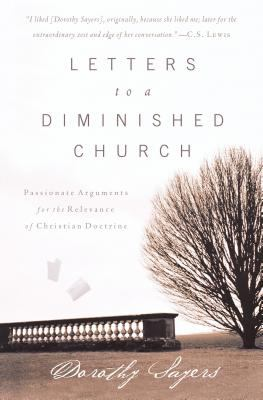Letters to a Diminished Church By Dorothy L Sayers
W Publishing Group, 2004. 284 pages. Nonfiction
In her writings, Dorothy L. Sayers turned the popular perception of Christianity on its head. She argues that the essence of Christianity is in the character of Christ - energetic, dramatic, and utterly alive. This collection of sixteen brilliant essays reveals Sayers at her best - a robust view of Christianity as startling and relevant today as it was fifty years ago.
In the New York Times Book Review, when they interview an author, they often ask them whom they would invite to a dinner party. If I could answer that question, Dorothy L. Sayers would definitely be on my list. Better known for her Lord Peter Wimsey mystery series (which I also love and highly recommend), she was a very intelligent woman who graduated from Oxford in the 1910s, when women earning degrees was still a novelty. She translated Dante's Divine Comedy and was friends with C.S. Lewis. 'Letters to a Diminished Church' is a sharp and pertinent critique of modern society and how religion can sometimes get mixed up with the world, Through that critique, she shows a light on the proper way to live a Christian life, by focusing on the dogma or doctrine of Christianity. Her command of language makes this a delight to read. If you are a fan of C.S. Lewis, I highly recommend this book.
If you like Letters to a Diminished Church, you might also like:
By C.S. Lewis
Harper 2001. 227 pages. Nonfiction
One of the most popular introductions to Christian faith ever written, Mere Christianity brings together Lewis's legendary broadcast talks during World War Two. Here, Lewis provides an unequaled opportunity for believers and nonbelievers alike to hear a powerful, rational case for the Christian faith.
A collection of scintillating brilliance, Mere Christianity remains strikingly fresh for the modern reader and at the same time confirms C.S. Lewis's reputation as one of the leading writers and thinkers of our age.
By Madeleine L'Engle
Convergent Books, 2017. 224 pages. Nonfiction
Most of the literature on Genesis and creation emphasizes what was created, and how. But in And it was good, Madeleine L'Engle casts long, loving, and perceptive glances at not only the created universe but at its Creator as well. At every level she sees the connections between Made and Maker, and in the vast beauty, order, and complexity of our world she observes many of the characteristics of God, the first poet. Just as L'Engle learns about God from his book Genesis, we learn about this human author from her book And It Was Good, the first volume in her Genesis Trilogy.
By G.K. Chesterton
Garden City, 1955. 280 pages. Nonfiction
According to the evolutionary outlines of history proposed by Wells and others, mankind is simply another sort of animal, and Jesus was a remarkable human being, and nothing more. Chesterton's thesis, as expressed in Part I of the book ('On the Creature Called Man'), is that if man is really and dispassionately viewed simply as another animal, one is forced to the conclusion that he is a bizarrely unusual animal. In Part II ('On the Man Called Christ'), Chesterton argues that if Jesus is really viewed as simply another human leader and Christianity and the Church are simply another human religion, one is forced to the conclusion that he was a bizarrely unusual leader, whose followers founded a bizarrely and miraculously unusual religion and Church. "I do not believe," he says, "that the past is most truly pictured as a thing in which humanity merely fades away into nature, or civilization merely fades away into barbarism, or religion fades away into mythology, or our own religion fades away into the religions of the world. In short I do not believe that the best way to produce an outline of history is to rub out the lines."
MGB




No comments:
Post a Comment